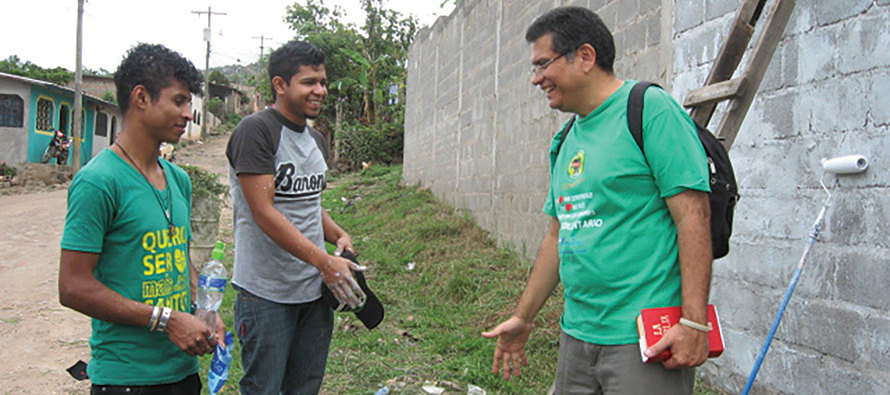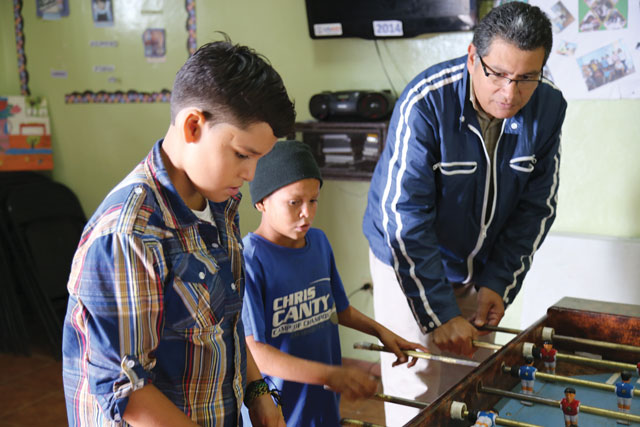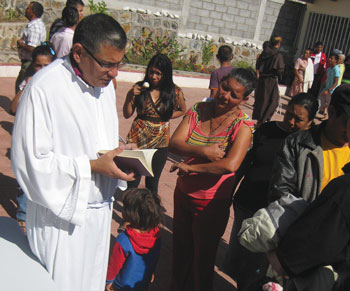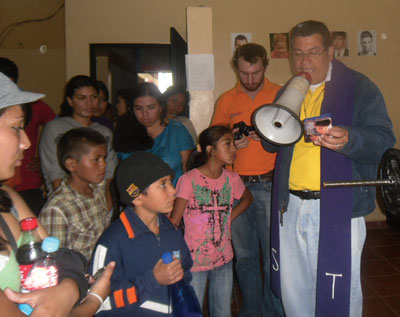Fighting gangs one youth at a time

Image: Zúñiga prays with youth who are about to paint a mural with a positive message for their neighborhood, La Nueva Capital. The young people belong to Youth Against Violence.
"I don’t want to look like a hero.” It’s hard for Father Alexis Zúñiga, S.T. to talk about his calling—first to be a missionary priest and later to try to stop gang violence in Honduras—because, he says, “I don’t want to use the stories of other people to make myself look like the big missionary hero.”
He knows that people like himself are sometimes glorified in headlines: “Priest sacrifices comfortable life to live in barrio,” or “Priest risks life to work in world’s most dangerous region.”
Those things are true about Zúñiga, but there’s much more to his life and work than that. In the midst of poverty and crime, he appears to have bloomed. “I feel closer to heaven than I ever have been,” he says. He loves his daily work with poor teenagers, presenting them with both the gospel and concrete life options. Since 2012 he has helped to found two outreach organizations aimed at gang prevention, and he has been named pastor of a new parish in the hardscrabble La Nueva Capital neighborhood of Tegucigalpa, Honduras.
Like church people around the world who labor in tough urban areas, Zúñiga faces big challenges. Since he began his ministry in Honduras, six people involved in the violence prevention programs have died violently themselves. Murders, thefts, kidnappings, drugs, assaults, rapes—these are part of the reality of the poor areas of Tegucigalpa, the capital city of Honduras.
Crime is prevalent and well-organized in this large city. Gangs act with impunity because the country’s criminal justice system barely functions. Ninety percent of murders in Honduras are never prosecuted, according to a 2015 United Nations report.
“I’m fearful sometimes when I’m alone in my little house or when I’m out walking alone at night,” Zúñiga says. Still, he was deeply drawn to his three-year-old mission to prevent gang violence in his hometown.

Called to a community
Zúñiga left Tegucigalpa at 26 after joining the Missionary Servants of the Most Holy Trinity (also called Trinity Missions). In the early 1990s, as a student of social work at the National University of Honduras, Zúñiga had fallen away from the church. But he underwent a conversion, began practicing his faith again, and started to attend daily Mass. “I knew the schedule of Masses all over the city,” he says.
The idea of religious life had occurred to him, but he didn’t have a strong sense to pursue it. One day, after coming across an ad for the Missionary Servants of the Most Holy Trinity for the umpteenth time, he boarded a bus. At the back of his mind was the ad he had seen, and his prayer was that God grant him clarity about his life path. At that moment, riding the bus, he had a powerful experience that later his spiritual director would confirm as an experience of God.
“It was an impact like an explosion within me, something mystical, an experience of God saying, ‘It’s me.’ I was terrified,” he says.

He went to Mass to pray about what had just happened. The gospel that day told of Jesus walking on water, inviting Peter to do so also. When Zúñiga heard the words of Jesus telling Peter to come, he says, “It was a strong hit in my heart, almost like a heart attack. Again, I was terrified. I was disconnected from the world. When I came back to awareness to the reality of the Mass there, I heard the words of the priest: ‘Why did you doubt, men of little faith?’ ”
The next day, he contacted Trinity Missions, and a year later he finally entered the community, at peace that he was where he belonged. Even so, it was not a smooth transition at first. “In the beginning I was very anxious. I am more used to being a coward than a brave guy,” he says.
While in formation and as a young priest, Zúñiga worked in the congregations’ missions in parishes in New Jersey, Florida, and Costa Rica. He also served as his community’s formation minister for two years.
A second calling
Many years into his life as a missionary, he experienced another call, a calling within a calling. For a few years, he had been drawn to working with young people on the margins of society. These young people, typically from poor areas and often from problematic families, are the ones who gravitate to gangs. Zúñiga wanted to reach them with the gospel message, to extend a hand of hope, friendship, and opportunity for a better life.
He began to long to immerse himself in work with gang members or those at risk of joining them. Much of the strong pull he felt toward this work came from the fact that his own brother, Erick, had died in gang violence in Central America in 2003. Over time Zúñiga found unbearable the internal struggle he felt about living a comfortable life in ministry in Costa Rica while knowing there was extreme violence in the northern triangle of Central America. The triangle—consisting of Guatemala, northern Honduras, and El Salvador—is one of the most violent, crime-ridden areas in the world.
By 2010, it became clear to him that he needed to follow Jesus into the Central American cities that were convulsing with violence. Eventually the superior of his community supported him in this mission, encouraging him to forge a ministry for at-risk youth. Zúñiga’s own personal loss of his brother unites him with the thousands of families in Central America who have experienced similar tragedies in recent decades from civil wars and criminal violence.
Learning the territory
In 2011, Zúñiga began his ministry by spending almost a year learning what other communities had been doing to counter gangs. He spent time in areas in Central America that suffered from gang violence and met leaders who were doing outreach to address the problem. On his return to Tegucigalpa in 2012, he became involved in youth ministry with an eye toward gang prevention.
Today, his daily work with young people takes many forms. On any given day he might lead a retreat, celebrate sacraments, visit the sick, or spend time with groups of young people. He might hold meetings to plan numerous activities sponsored by a community center that was organized to help prevent street gangs.

Zúñiga became co-founder of the Centro de Alcance por Mi Barrio (Outreach Center for My Neighborhood), a youth-focused community center that sponsors social and arts activities and job training workshops. The center is funded by the U.S. Agency for International Development.
In 2013, Zúñiga became involved in a second program for youth: a pilot anti-violence program called Juntos en los Corridos de Narcotráfico (Together in the Drug Traffic Corridors). The anti-violence program, funded by the Catholic charity Caritas, trains youth leaders to counter the violence in their communities.
In these many activities, Zúñiga does not labor alone. “The Spirit is giving us the grace of being together,” he says of the seven other individuals with whom he collaborates. They are a Catholic deacon and his wife; a laywoman missionary from Columbia, three Catholic sisters, and a Franciscan brother. The eight of them are present in the same impoverished area of Tegucigalpa, and they collaborate on parish and gang prevention projects.
In addition, Zúñiga is pastor at Parroquia Santisima Trinidad, Holy Trinity Parish, a church that was formed in the neighborhood after he began his gang prevention youth ministry.
Against the odds
Projects and activities have led to a drop in violence in Tegucigalpa, but Zúñiga knows he is still up against formidable forces, and he wonders if the tide can truly be turned on gangs. Some of the youth that his program touches have been in violent gangs or still are, but many of them are finding an alternative to life on the streets through church programs, job training, and social outreach programs. For example, one boy came to the Outreach Center to kill a rival gang member, but volunteers talked him out of bloodshed that day and eventually encouraged him to get involved at the center. He still has ties to a gang, but Zúñiga is hoping to help him start a small business and leave the streets.
“I believe that our presence is a real and significant thing. We are the healing presence of Christ for many of these kids,” he says.
Zúñiga doesn’t put a number on turnaround stories, but he notes that hundreds of kids have had positive experiences with the Outreach Center and its youth anti-violence efforts, and he happily shares stories of incremental, healing progress.
“This is an adventure of faith,” he says. And like any good adventure, no one can be sure how it will turn out, but it is an adventure for which he is grateful.
Tags
Related
- African dream: my 17 years in Kenya
- Lessons in love from central Brazil
- Missionary sister falls in love
- Sister Dorothy Stang: Her dying shows us how to live
- Refugee crisis 'a battle for our humanity' in Jordan
- Starting over from scratch
- My mission: To be an instrument in God’s hands
- Beginning again in Ireland
- And Jesus said, “Feed my lambs.”
- Holy Toledo! How I wound up in Taiwan Read More
Most Viewed
- Find your spirituality type quiz
- Questions and answers about religious vocations
- Celibacy quiz: Could I be a nun? Could I be a brother? Could I be a priest?
- Resources for older discerners or those with physical and developmental differences
- About Vocation Network and VISION Guide


